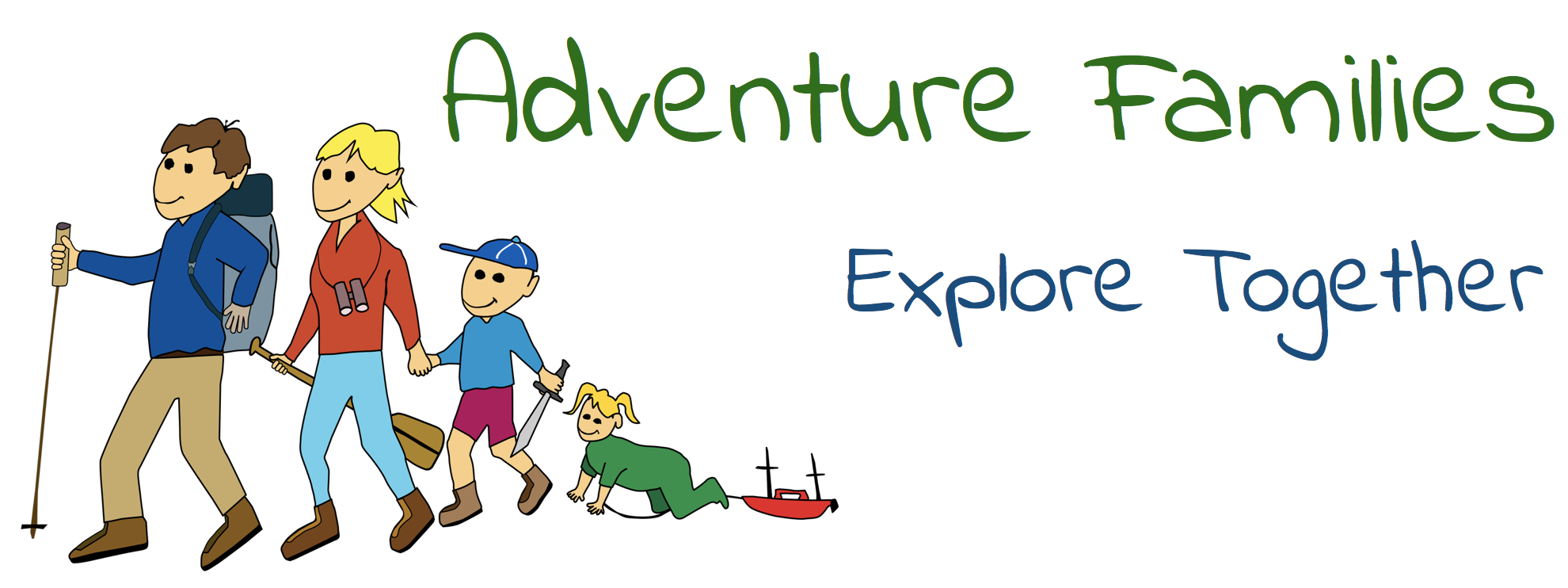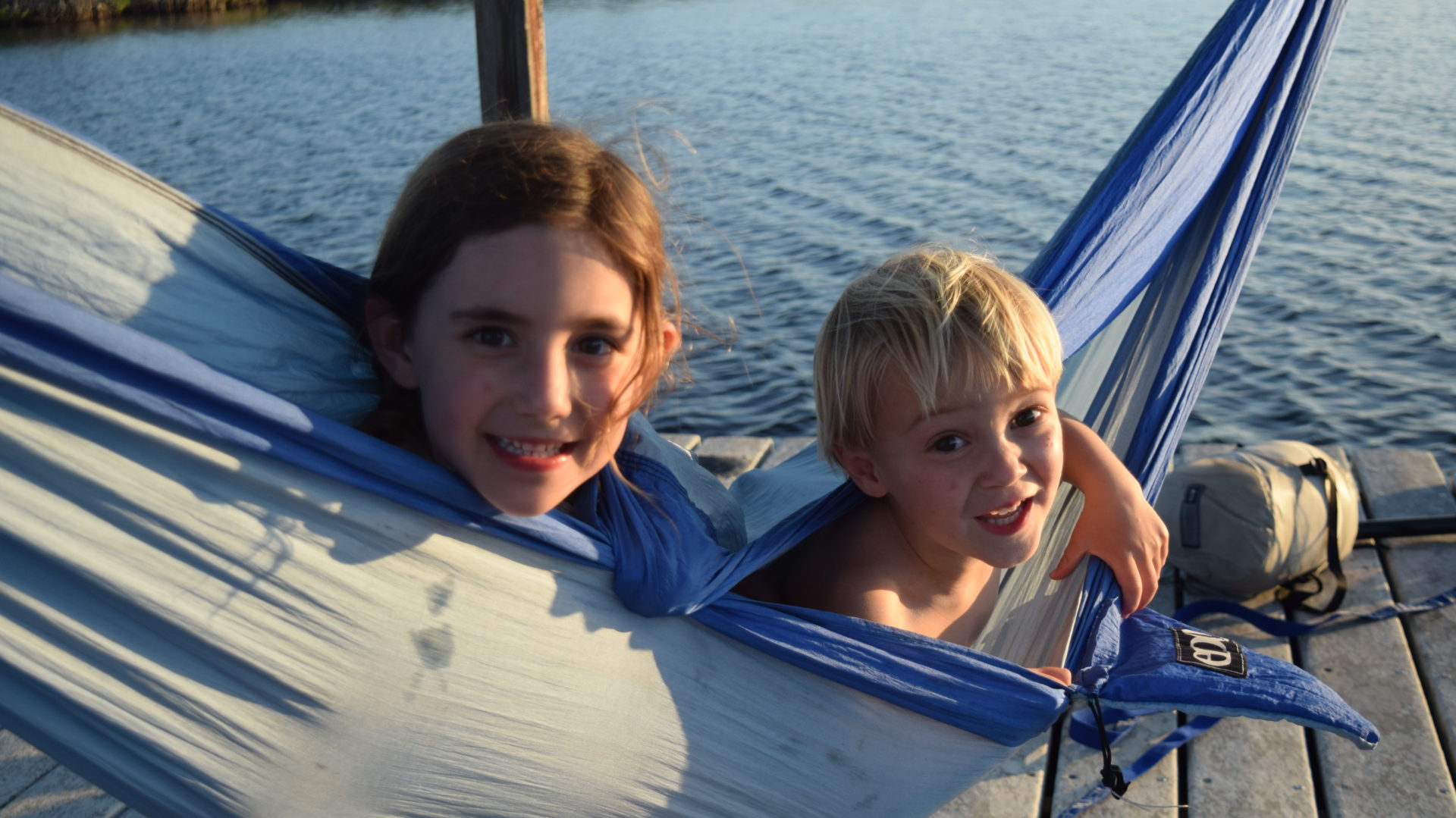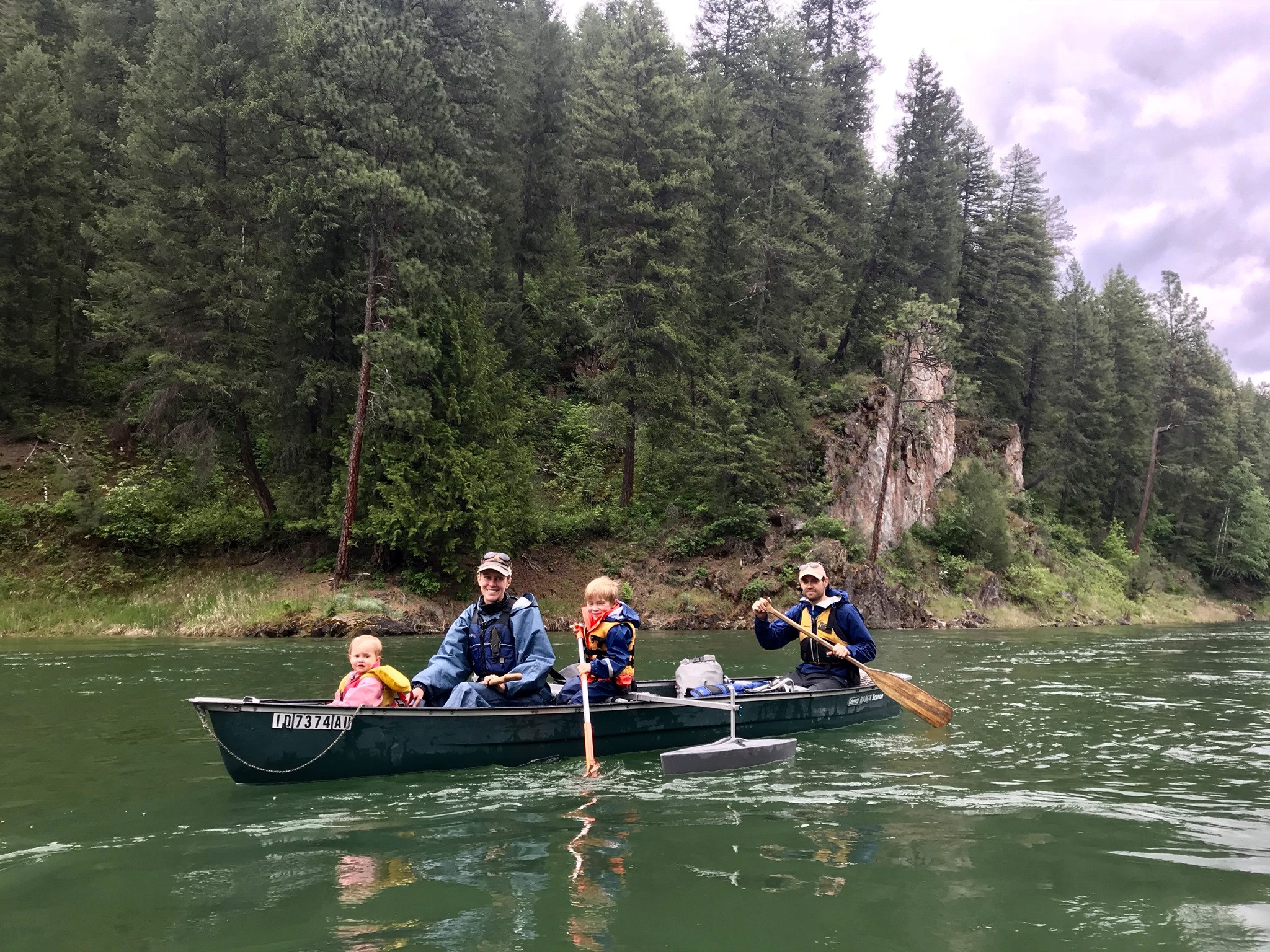As we pushed off the shore for our first family canoe trip of the summer, I held my breath. Our one-year-old daughter had protested loudly when I strapped on her life jacket, making me think we might be in for a miserable afternoon. While our son, Talon, had dozens of canoe trips under his size 4T belt, Lyra hadn’t yet been afloat as a busy toddler.
Luckily, Lyra’s screams turned into delighted coos as our boat skimmed across the green water. She bounced between my legs, pointing at the birds and trees. From his perch in the center, Talon picked up his small paddle, proud to help propel us across the lake.

My husband and I are water people. We’ve sailed across the Pacific Ocean, snorkeled around the Caribbean, paddled through the Everglades, and rafted down plenty of wild rivers. Once we had kids, we began integrating them into our adventures from the get-go.
Canoes have been the perfect way for us to introduce our children to the water.
Two years ago we bought a used 15-foot Coleman to explore lakes and rivers near our home in Montana. We’ve since added a small outboard motor and a sail, too. Sometimes we go out for an hour, and sometimes we pile in the camping gear and head out for a week.

Here’s why we recommend canoes for your family, too:
- Affordable. This sport is low-risk and low-investment to try out: you can buy a good used canoe for ~$300, or rent one for ~$50/day to try it out first.
- Versatile. Canoes come in a wide range of sizes and styles, ranging from sleek wooden boats to wide plastic boats and even inflatable versions. (Hint: these are the cheapest options and easiest to transport, but they don’t last as hard-shell canoes and require more time to inflate/deflate.) Some are designed specifically for speed or to handle whitewater, but all canoes will work on any calm water bodies you want to float.
- Simple. It doesn’t take long to learn how to paddle a canoe, even for young kids. You can watch videos online to see the basic steering strokes, or play around in a small pond to figure it out on your own. Plus, these boats can be stored outside, and are maintenance-free!
- Easy transport. Most canoe’s weigh 50-80 pounds, which is totally manageable for two adults. They can be placed upside-down on top of your car, no trailer needed. (Hint: foam pool noodles work well to protect your vehicle’s paint if you don’t have a roof rack.)
- Sturdy. Aluminum and plastic boats are particularly good for kids, as their tough, washable, and more stable—look for boats with flatter bottoms, which feel less “tippy”. As you might expect, it’s possible to tip over in a canoe, especially with squirmy kids around. Test the stability near the shore, wiggling hips and moving around in the boat to see how much side-to-side leeway you have before it feels uncomfortably. (Hint: We bought these stabilizer pontoon floats for our canoe, which make it super safe and allow us to walk around the boat or stand up to cast for fish.)

Ready to try it out this summer? Here are some tips:
- It gets easier. Any new activity is tough at first until everyone learns the ropes. This is doubly true if your kids are young. Remember that even if canoeing isn’t quite as fun as you’d hoped the first couple of times out, you’re building skills that will last you and your kids a lifetime—and give you wonderful bonding opportunities for years to come.
- Get excited! Your happiness (or crankiness) is contagious. If you’re thrilled to be on the water, your kids will be, too. Let them help plan the trip and help pack the canoe so the whole family is invested in the outing.
- Offer clear rules and rewards. Before you launch, set a few clear safety rules: don’t stand up without asking, no leaning or jumping over the side, keep life jackets on, no whining (ha!). Try offering a reward at the end of the day if they follow the rules, such as a sweet treat or a movie.
- Designate a special spot for everyone. Decide which adult will be in the stern (back seat) steering—they have less leeway to help manage the kids. The adult in the bow (front seat) can help paddle forward when needed, but can also take breaks easily. If you have a toddler, stand them between the adult’s legs in the bow where they can see and move around a little. Babies can be worn in a soft carrier. Older kids can sit on the center crossbars or a middle seat (if the canoe has one) to help paddle, or hunker down to play in the bottom of the boat.
- Take your time. Like most outings with children in tow, the trip will probably take longer than you think. While you and your partner might want to race across the lake, the kids will enjoy it more if you take plenty of breaks. In fact, much of the joy in canoeing is playing on shore! Stop often at interesting spots to swim, have lunch, and explore islands or beaches you couldn’t get to without a boat. And don’t expect (or force!) the kids to add much horsepower—paddling is simply a fun diversion for them.
Recommended Packing List:
Any of the items below should be placed in a waterproof bag since the bottom of the boat gets wet from everyone’s shoes and dripping paddles. If you don’t have a dry bag, wrap your backpack or tote in a sturdy trash bag. Buckets also make for great storage in a canoe.
Life jackets: Everyone needs to wear a life jacket. Even if the grown-ups are stellar swimmers, you’re the role models for your kids. Have kids practice wearing theirs before you get in the boat, so they get used to them. (Hint: If you can’t find a comfortable jacket for your kiddo, try U.S. Coast Guard approved water wings that are less bulky.)
Clothing:
- Sandals with straps or waterproof rain boots.
- Sun hats and sun-protective clothing.
- Rain gear, which can double as windbreakers.
- Extra outfit for little kids who will likely get wet and muddy playing.
Food and Drinks: Like all outings with kiddos, make sure you pack lots of easy-to-grab snacks to keep them occupied, fueled, and happy. We like to bring “special” drinks for the kids to make sure they stay hydrated in the sun: lemonade powder in their water bottles is a favorite
Gear:
- Toilet paper if you’re not near public restrooms.
- Umbrella or pop-up tent for shade in the boat or on shore—perfect for passing rainstorms, too!
- Seat pads or stadium-style folding seats.
- Rope to attach to the bow to help pull the boat on shore.
- Maps of the area you’re paddling.
- Tarp or blanket for picnics or for “beds” for kids in the bottom of canoe.
- Extra paddle(s) for the kids: emergency paddles that are adjustable and light-weight work well.
Fun Stuff:
- Binoculars (monoculars work best for you young kids—we love ours!)
- Field guides
- Fishing rod
- Frisbee
- Bubbles
- Chalk (to draw on rocks or the inside of the boat—it washes right off!)
- Bucket (have the kids fill it with rocks/sticks/leaves on shore, then throw them overboard one at a time while you paddle)




